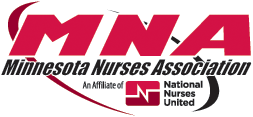FOR IMMEDIATE RELEASE
Contact: Rick Fuentes
(o) 651-414-2863
(c) 612-741-0662
rick.fuentes@mnnurses.org
Barb Brady
(o) 651-414-2849
(c) 651-202-0845
barbara.brady@mnnurses.org
(St. Paul) – March 26, 2019 – Members of the Minnesota Nurses Association in the Metro area begin negotiations today with Twin Cities hospitals to reach agreement on new contracts that will ensure quality patient care. Nurses will approach negotiations optimistic that a cooperative approach with Metro hospitals will lead to a settlement while still firmly believing in contract proposals that value nurses and patients.
“Nurses are united in putting forth proposals that recognize the value of their care and their professional judgment to protect patients,” said Jordan Foerster, a negotiations team member and a Registered Nurse at Fairview.
Fairview nurses start their negotiations with their hospital today. On Wednesday, Allina, Children’s, Methodist, and HealthEast nurses will begin negotiations with their respective hospitals. On Friday, North Memorial nurses have their first day of negotiations with their employer. Negotiations are scheduled to continue about once a week through May. The current contracts expire on May 31, 2019.
“Staffing and workplace violence are still daily issues in our hospitals,” said Emily Sippola, Registered Nurse at United Hospital and negotiating on behalf of Allina nurses. “We’re asking hospitals to track and report violent incidents with frontline staff to help create prevention plans to protect nurses and patients.”
A HealthEast facility was the site of a fatal violent incident in 2015. Violence is commonplace across Twin Cities hospitals. In 2018, Allina Health hospitals reported more than 3,000 violent incidents against nurses alone.
“Nurses need to have a say in shaping staffing levels according to patient needs, not just what’s the easiest, cheapest option,” Foerster said. “The present system of forcing nurses to keep up with patient needs and constantly calling and texting for more help isn’t safe or sustainable. It only leads to burnout for nurses.”
MNA nurses in the Metro are united in proposing that they have a stronger voice in the creation of “staffing grids,” which determine how many nurses are needed to provide patient care. They also hope that increases to nurses’ compensation will ensure that hospitals can attract and retain the best nurses who can provide the highest quality care.
“We’re looking forward to productive conversations with the hospitals,” said Elaina Hane, RN at Children’s St. Paul. “We’ve put a lot of work into proposals with contract language that can work for nurses, the hospitals, and, of course, the patients. We expect Children’s and the other Metro hospitals to meet us with the same commitment to working on an agreement.”
###

